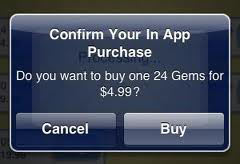 Apple recently settled with the Federal Trade Commission (FTC) again, for charges to consumers iTunes accounts that stemmed from purchases that their kids may have made doing in app purchases.
Apple recently settled with the Federal Trade Commission (FTC) again, for charges to consumers iTunes accounts that stemmed from purchases that their kids may have made doing in app purchases.
For the ease of the user, when you make an in-app purchase with Apple’s iTunes app store on your iOS device it asks for your password or thumb print and then keeps the gateway open for about 15 minutes. This means that if you wholeheartedly decided to let your kid power up in the My Little Pony Game, or buy a couple of extra cheats in Candy Crush, your kids could in-turn continue to charge your iTunes account for the ensuing 15 minutes.
These charges can actually rack up if you aren’t paying attention. Several parents don’t even know that you can go onto your iTunes account on your computer and see your current charges to monitor for un-authorized, or kid authorized purchases.
The FTC contends that Apple didn’t warn parents about this 15 minute window of opportunity for a kid stuck on level 108 of Candy Crush or trying to buy more dragon food.
“In aggregate, children ran up millions of dollars in charges without their parents’ knowledge or consent,” said FTC Chairman Edith Ramirez.
Apple has settled for $32.5 million with the FTC. Apple is now required to refund parents who’ve made the claim that their kids racked up extra charges. The ceiling for the payback is the $32.5 million dollars. If refunding parents doesn’t cost Apple the entire $32.5 million they must surrender the difference to the FTC.
A few years back, Apple had already settled with the FTC for in-app purchases made by kids. Tim Cook told Apple’s staff that the latest settlement “smacked of double jeopardy”.
“The consent decree the FTC proposed does not require us to do anything we weren’t already going to do, so we decided to accept it rather than take on a long and distracting legal fight,” Cook said in an internal memo posted to re/code.
Apple had already been working on this in app purchase issue with parents. The company had sent out emails to 28 million app store customers who had purchased or downloaded games geared towards kids that had in-app purchases. When one of those emails bounced the company mailed a postcard to the address on file. That effort yielded only 37,000 responses and all of those parents were already refunded

